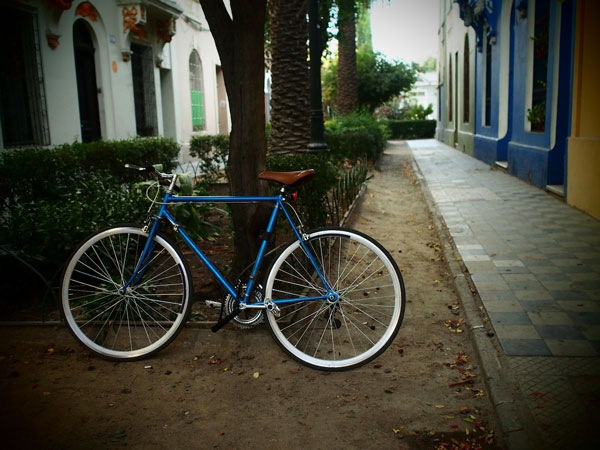One of the many hoops that the Chilean government has us gringos jumping through, like trained seals (or are those dolphins?) is going to Registro Civil to get a “certificado de antecedentes.” This is a perforated form that they give to you at low cost (anyone know how much these days, I seem to recall 800ish pesos) that certifies that you have not been convicted of a criminal act here in Chile. The last time I had to get one, it was to turn my residencia sujeto a contrato (limited residency, subject to my work contract) to residencia definitiva (definitive (not permanent) residency).
And as I walked down the street, pastel blue and white form in hand, someone offered to buy it from me. Certificado? Certificado? he said. What? Certificado! Se compra! (I’ll buy it). Really? How much? A ver, (let’s see) he said. He offered me 10,000 pesos, and I assume he had a bottle of liquid paper (say: correctór) or similar in his pocket, with which he would change the name, and presumably the RUT (national ID number). While I feel for people who want jobs, despite having transgressed in the past, fraud is not one of the experiences I’m looking to collect before my next birthday.
So I said no.
And this got me thinking about identity theft. I mean, this wasn’t exactly identity theft, so much as it was identity borrowing. And maybe not even really borrowing, since all of my identifying information would be erased. So then I was thinking about identity borrowing, which brings me to medical care.
What do you do if you have a situation that requires medical care, but you have neither ISAPRE (private health insurance) nor FONASA (state health insurance)? Well, if your doctor is complicit and so is your buddy, you use that person’s carnet (national ID card) to buy a bono (copay coupon). You return your friend’s carnet, present the bono to the centro de atención médica (clinic), see the doc, and everyone is happy. Oh, except for the people who monitor fraud, and probably public health.
Who would do such a thing? Who doesn’t have medical insurance? People in the informal economy, that’s who. Or people who are cesante (unemployed). I bet if you asked around, you’d find that someone you know has done it. I’m not naming any names, but I’m telling you, it’s out there.
All of this came to my mind recently because my US-based credit card company has recently employed new identity protection, because my 12-letter caps and lowercase password with numbers in it wasn’t enough. Now they had me select from a set of questions that they will ask me when I log in.
I’m all for other people not using my credit card, but the questions seemed singularly crafted to alienate me, their user.
The entire first page of questions were ones I could not answer.
Pet’s name (don’t have a pet)
Favorite TV show (don’t have a TV)
Father’s profession (idem)
First car (oy!)
Husband’s name (seriously?)
Anniversary (what?)
How you like your hamburgers cooked (okay, this one might be hyperbole)
I was starting to feel like some kind of a non-tv watching, non-animal-loving, anticar, fatherless misanthrope when I saw that there was a second page of questions, where I was asked things like shoesize (yay! I wear shoes!), date eldest sibling was born (yay! I have a sibling!), etc. I felt somewhat better about myself but worried about the shoeless and siblingfree. I’ve been told I’m overly empathetic. What say you?
And lest you think that Chile is not concerned about identity theft, I will tell you that when I pay bills online (or transfer money), I am asked not only for my password, but also the coordinates on a little plastic card that I was issued a few years ago. In what can only be described as a you-sunk-my-battleship precision (with apologies to anyone who never played this peace-mongering game) , I type the numbers into the dialog box and money disappears from my bank account. Win-win, so long as I don’t lose the card. Though I bet that guy who offered to buy my certificado de antecedentes could hook me up.










Here the bank sends you an SMS with a secret code that you need to then put into the computer to finish the transaction. Which is probably a lot simpler than battleship cards.
When you buy things at the supermarket, you can pay with your ATM card, and then have to secretively enter your pin number into a little plastic keypad thingy that the teller gives you in order to let them deduct your shopping from your account. What is surprising about this is that the teller then usually asks you to sign the receipt that the little box gives you. Which always struck me as a little bit silly, given that having the card and the pin number should really be enough. I mean, I could use those two things to go to town drawing cash at the cash machine, so what added security does making me put my name on the receipt provide?
In reality, I just smile and sign the thing. As far as I can tell, neither of us really ever cares to explore the question 🙂
Wow. And I thought it was getting complicated here. No, i don't think you're overly empathetic. I couldn't answer some of those first questions either. I actually see those same questions for passwords on a lot of social networking sites.
Oh my gosh I should have stolen someones bono. Why didn't I think of that??
I suppose there is a market for almost everything! I wonder how often you can get one of those certificates? 🙂
I also often wonder how someone would fare if they stole my identity. Surely not being able to pronounce your own name would be a hindrance to fraud. That and having to speak Spanish with an accent.
I am amazed at lack of concern about identity theft in Chile… or I'm more shocked at the tremendous concern aobut it in the US. My mother even shreds her junk mail, while I've seen people in Chile people throw out unwanted personal documents with the old newspapers.
And insurance borrowing used to be very common until the major companies started using that little fingerprint monitor…
I think they should make the questions more interesting such as:
–Who is your secret celebrity crush?
–What is your favorite ice cream flavor?
–Who would you say is your arch enemy?
I think we all have answers to these questions.
Wait… I don't have my health insurance yet. That sounds like a good idea.
Our cc company often blocks us from using our card because we're in a new location. They do this even when we have taken the time to call them and let them know we're going to be in a new location. Makes. Me. Crazy. Worst of all? They blocked in when I was just in the US (in spite of notifying phone call) and then wouldn't let me activate it because it's a joint account but my husband is the "principal" on the account. I asked the woman what year it was where she lived but it didn't help.
Bystander, yeah I thought having to pronounce my name, with all of its tricky vowels would be a deterrent, but hey, you never know. Plus my RUT makes me born in 2004, which is tricky to pull off as a full-grown adult.
Richard, I'm sure you feel very, very protected with all the safeguards. Can you buy things at the supermarket in installations? Anytime we buy with cc they ask us if we want to pay in "cuotas." Like even for a sandwich.
Flygirl, glad you don't think I'm too empathetic. I was so surprised not to be able to answer the questions. I mean, I'm kind of regular, or at least I used to think I was!
Margaret, they don't have that fingerprint thing at my Isapre, only at the clínica. One time I tried to change my address at my Isapre and I didn't have my carnet, and I couldn't, because they didn't have the fingerprint thing!
Stilllife, that's hilarious! Like I'm in an emergency situation, and I have to think, wait, what is that guy's name, the one in that movie…
Abby and Sara, I'm sure you're not really considering running afoul of the system… Which reminds me I still owe SII from last month. Oy.
PlanetNomad, you just reminded me that I need to activate my new CC come July, and remind them that I'll be using it in North America. I've tried to impress upon them that I'm in the Americas plural, but I don't think they have a box to check for that. And nice comeback on the year you live in question. She deserved it!
Ah, planetnomad, you thought you had a joint account just because they called it that. I call these Animal Farm (or George Orwell) accounts: all animals are equal but some animals are more equal than others. And your husband is always away when you need to do anything with the account.
My credit card company did this too, recently, and I had to give the name of my favorite roommate and my childhood pet, among other things.
Thing is, this doesn't stop someone from USING MY CREDIT CARD if they steal it, they just can't log into my online account. It's not going to stop them from buying a TV.
aren't the unemployed, indigent people covered by FONASA D? they don't cotizar the 7% of their sueldos, but they can still go to the hospital…i like your bono buying scheme though.
Hey Marisa, thanks for commenting. I don't know if this bono-buying scheme (which I am not advocating) is unique to people that are cesante (not working) or what, but I will admit that I know at least one person that has done it. This isn't for emergency care, but for preventive, like yearly exams and the like.
In the clinic I work in we take bonos from sources other than the patient. Usually they get a bono from their partner or other family member. It can be done in reverse too… I have a private fee (I can not receive bonos) which is pretty hefty but I also see FONASA patients and they bring a bono (which is 1/4 of my fee for the patient) for my husband to cash (Dr. receiving FONASA bonos). In both scenarios I consider we're doing a service to people who otherwise could not get quality health care and would be forced to go to a public hospital (repeat after me: bomb-shelter!). Ideally the patients could be received in our clinic for free but someone has to pay the rent.
On the banking… el Chile gives you a little Tamagotchi looking thing with a digital screen on it. Everytime you make a transaction ANYWHERE on the internet a message pops up asking for a security code. This code you get by pressing your Tamagotchi's button and noting the random digits displayed. It works in real time, in, admittedly, a way that I don't fully understand.